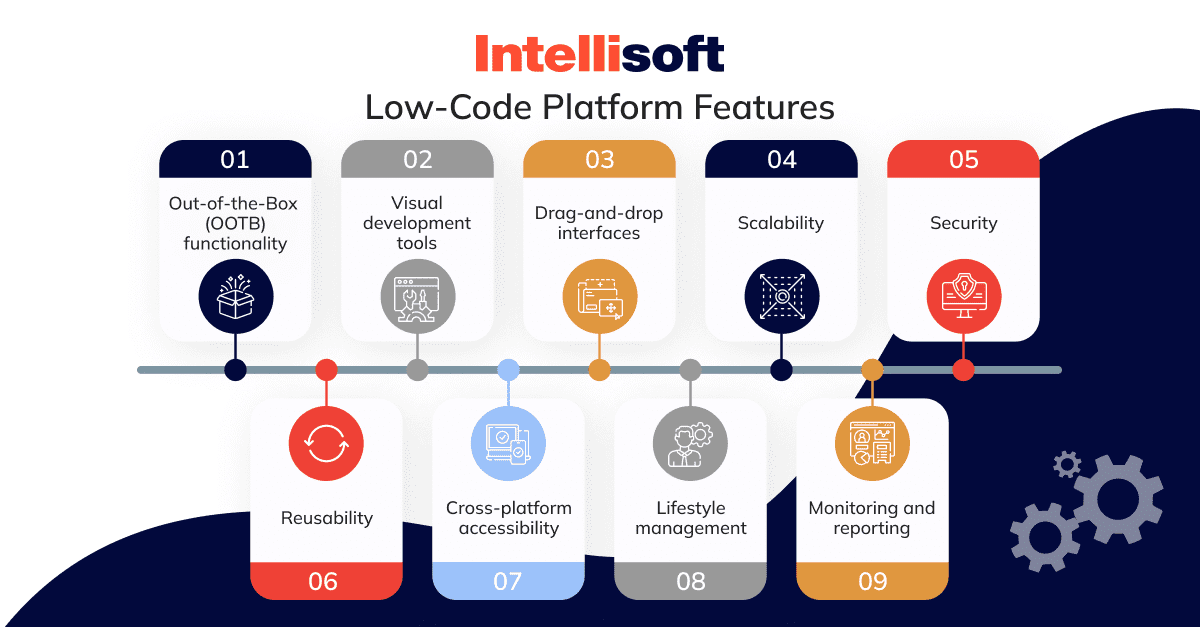Visual Development Environment :
Drag-and-Drop Interfaces: Low-code platforms provide visual tools for designing applications. Drag-and-drop elements allow developers to rapidly assemble applications without writing code.
Pre-built Components and Templates: A lot of platforms that support low-code come with components and pre-built template that allow developers to build prototypes quickly and develop applications without starting entirely from the beginning.
Coding requirements that are less invasive:
Automated Code Generating: The low-code platform generates the code underneath based upon the visual models created by developers. This eliminates the need for manual coding.
Reusable component: Developers may utilize the same components on various projects. This helps reduce the time spent writing code and testing.
Collaboration is streamlined:
Integrated Development Tools : Low codes platforms usually have tools to test, version control and deployment. They aid in collaboration between teams.
Development by citizens: Using intuitive interfaces and reducing bottlenecks that are often caused by lack of developers, business users and non-developers are able to assist in application development.
Rapid Iteration and Prototyping:
Fast prototyping: Developers can quickly design prototypes in order to gather feedback and validate ideas, resulting in faster iterations.
Easy modifications. The visual interface low-code development provides allows users to easily update and change applications. This speed up the process of improving and refining the application based on feedback from users.
Pre-built Integrations:
API Integrations: Platforms that are low-code usually include pre-built connectors to well-known APIs and services which reduce the time needed to integrate with external systems.
Data integration tools: Tools for data integration are included to help simplify the process.
Deployment of Scaling:
One-Click Installation: Many low-code platforms provide the option of installing with one click that reduces the amount of work and time needed to install applications.
Cloud-based solution: Cloud based low code platforms are able to handle the management of infrastructure and scale. This lets developers concentrate on functionalities, application logic and features rather than deployment logistics.
Low-code development of applications is a faster way to create apps. It streamlines and automates several aspects of the process. This allows for quicker delivery and adaptation to evolving requirements. View the most popular on front page for Low-code Platform for application development for more advice including develop web app, cross platform mobile app development, driver jdbc, rad application development, azure sql databases, push notifications android, develop cross platform mobile app, developing mobile apps, azure sql, azure sql and more.

The Benefits Of Low-Code Development For Governance And Security
Low-code software offers a variety of benefits in terms of cybersecurity and governance, which is crucial to ensure that all apps are managed, well-managed and in compliance throughout their livescycle. These are the main advantages.
Unified management console Low-code platforms usually provide a central administration console, where administrators are able to manage all the applications and ensure consistent governance within the company.
Role-Based Access Control RBAC : These platforms usually include robust roles-based access controls, which allow administrators define and enforce policies. Only authorized users will be able to access and modify specific areas of an application.
Compliance and Regulatory Adherence
A lot of low-code platforms come with built-in security features for compliance. They're designed to meet the requirements of industry standards and regulations, such as GDPR or HIPAA. They offer templates and tools to ensure that applications comply with these requirements.
Audit Trails: Many organizations use comprehensive log and audit trail systems, which enable them to monitor changes make, track access and assure the compliance of internal and external rules and regulations.
Enhance Security Measures
Data Encryption : Low-code platform typically provide built-in encryption of data in transit and at rest. This guarantees that sensitive data is protected.
Security Certifications: Many low-code companies have security certifications (e.g., ISO 27001, SOC 2) that show that they adhere to the highest security standards. This provides extra security for users.
Automated updates to ensure security:
Regular Patching and Updates Lowcode platforms typically handle regular updates to security. These patches protect software from the latest threats without requiring the involvement of developers.
Security Monitoring: Constant security monitoring tools can be included to provide real-time notifications and information on security concerns.
Data Governance
Data Access Policy: These platforms help organisations define and enforce policies for data access, making sure that only authorized users can access data and the data is utilized in a safe manner.
Data Masking and Anonymization: Built-in tools to mask and anonymize data ensure the security of sensitive information, especially in testing environments and development environments.
Consistent Application Lifecycle Management
Pipelines for deployment and development Low-code platforms provide integrated development and deployment pipelines, which contain security tests. They make sure security is maintained throughout the entire application lifecycle.
Version Control. Integrated version management can help identify and reverse any modifications that are made to the program, while ensuring that the integrity of it is maintained.
Authorization, User Authentication and Authorization
Single Sign-On (SSO) Support for single sign-on and other advanced authentication mechanisms simplify management of users and improves security.
Multi-Factor Authentication A lot of platforms have built-in multi-factor support, adding additional security to accessing applications.
Compliance Monitoring and Policy Enforcement Compliance Monitoring:
Low-code platforms often come with pre-defined policies templates that enable organizations to implement cybersecurity and governance policies quickly.
Compliance Monitoring Tools: These give continuous monitoring and a report on compliance status. This allows you to spot potential problems and take action to address them.
Integration into Existing Security Infrastructure
Seamless Integration: Low-code platforms have been designed to be integrated with existing security tools and infrastructure, such as identity management systems SIEM (Security Information and Event Management) solutions, and firewalls.
API Security: Built-in API security features help protect the data of API users, ensure integrity of applications and ensure safe integrations.
Best Practices and Training:
Guided Best Practices : A lot of platforms offer guidelines and best practices that can help non-developers adhere with security standards.
Security Training: A few low-code companies offer security training and resources that help users understand how to build and maintain secure applications.
Low-code development can provide a range of security and governance benefits which ensure that apps are developed and managed in a efficient safe and secure manner. These platforms have the frameworks, tools, and regulatory compliance necessary to secure sensitive data of customers, enforce policy, and ensure compliance with regulatory requirements, while also simplifying the management of and oversight over the process of developing applications. Have a look at the best Enterprise application development with Low-code Platform info for website advice including azure sql databases, cross platform app dev, microsoft azure sql, azure sql server, azure sql databases, jdbc server, push notifications, lowcode no code, multiplatform mobile app development, microsoft azure sql and more.

In Terms Of Vendor Support And Community Support, Low-Code Application Development Has Many Advantages.
Low-code development platforms offer significant advantages in terms of vendor support and the community. They are essential for successful implementations, continual maintenance, as well as continuous improvement. Here are a few of the advantages.
Comprehensive Technical Support:
Support Team with Dedicated Staff: Many low code platforms have dedicated support staff who can assist with technical questions, troubleshooting issues and providing guidance. They can ensure that issues are addressed promptly.
24/7 Support: Some vendors offer around-the-clock support, which is particularly beneficial for companies that are global and operate in various time zones.
Training and Onboarding
Vendors provide structured training programs such as webinars, tutorials, and certificates to assist users in becoming familiar with the system.
Personalized onboarding: A lot of vendors offer customized services for customers who are new helping them to set up the platform correctly and customize it to meet their specific needs.
Regular Updates & Enhancements
Continuous Improvements: Low-code vendors frequently release updates, which include performance improvements, new features, and security patches to keep the platform up-to-date.
Feedback Integration: Vendors frequently include feedback from users into their development cycles, making sure that the platform evolves to meet the changing requirements of their users.
Comprehensive Documentation:
Documentation: Comprehensive documentation is provided for the majority of products. It includes everything from basic to advanced customization. It helps users locate solutions by themselves.
API References: Comprehensive API documentation helps developers integrate the low-code platform with other systems and tailor their applications effectively.
Professional Services and Consulting:
Expert Consultation : Vendors offer consultancy services, including architecture design and complex implementations. They offer this service in order to make sure that their users are able to fully benefit from the platform.
Custom Development Service: A few vendors offer custom development services to create functions or integrates for their customers which are not readily accessible.
Community Support
Active User Communities
Forums and Discussion Boards: A lot of low-code platforms offer vibrant online communities in which users can seek answers, discuss solutions, and share the best practices.
User Groups and Meetups: Virtual and local meetings and groups of users provide opportunities to learn to network, share information, and exchange experiences with others.
Knowledge Sharing and Collaboration:
Community-Contributed Resources: Users often share templates, modules, and extensions that they have developed, which can be reused or adapted by others, accelerating development and innovation.
Crowdsourced problem solving: The collective experience and knowledge of the crowd is an excellent resource when it comes to tackling issues and coming up with creative solutions.
Learning and Development:
Community-led Training: A lot of groups host workshops, sessions for training, and webinars. They are typically led by experienced users, who offer practical insight and the most advanced methods.
Online Tutorials and Courses Community members often create and share online tutorials, courses, and how-to guides, enhancing the educational resources accessible to all users.
Feedback and Influence
Community forums are usually an opportunity for vendors to hear feedback from the public. This information can be utilized to design new features or improve the functionality of.
Beta Testing Programs. Members of the community who are active can participate in beta-testing programs. They will have early access to the latest features of the platform and an opportunity to shape the evolution of the platform.
Recognition and Support
Community Recognition Programs - Many vendors have recognition programs that recognize the contributions made by the active members of their communities such as MVP (Most Valuable Professionals) programs.
Peer Support. Community members provide peer support. They share their knowledge with new users and offer advice. This creates an atmosphere of support and collaboration.
Overall, the combination a robust vendor's support and a lively, active community offer a robust support system for low-code app development. Users will be able gain access to the experts, resources and collaboration opportunities they need to successfully build and deploy, manage, and enhance their applications.
